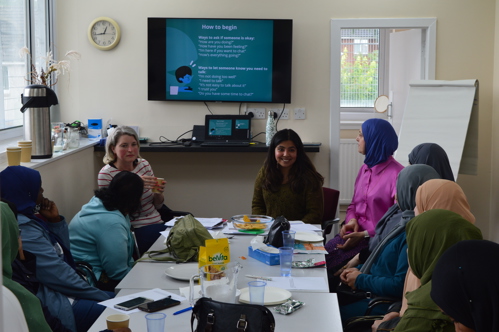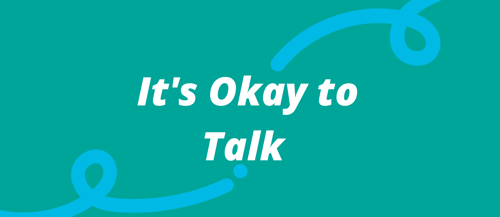
Values led partnership and community engagement
Case Study: Values led partnership and community engagement by Sahaj Kamra
This case study demonstrates how we worked with the West of Scotland Regional Equality Council (WSREC) to look at what is needed to address mental health stigma, alongside people in Scotland from specific minority ethnic backgrounds.
See Me recognises that terminology and labels used to refer to groups racialised and marginalised by society is ethically and politically complex, can be harmful and is subject to debate and update. Throughout this blog we have used the terminology partners themselves have used to refer to the communities they are led by and we have included a glossary at the end of the document to illustrate our own current understandings of key terms. We are committed to continually engaging with this critical debate to understand and mitigate harm.
Principles
This case study includes key principles: equity, social justice, different parts of our identities, reflexivity (questioning your own assumptions and how these influence what you do in any situation), and valuing diverse knowledge. These principles are reflected throughout the project and are core to intersectionality. Intersectionality is a way we look at how identity, health, social relationships, and power combine and play out in our interactions and experiences.
Purpose
See Me recognises its historic lack of engagement with racialised communities and the potential barriers this creates around how suitable our resources are for diverse communities. So with this partnership we wanted to look at some of our resources, and see what we needed to do differently. We started with the It's Okay to Talk resource by gathering perspectives from different groups and communities and incorporating their feedback.
Why WSREC?
WSREC is led by and primarily works with people from minority ethnic backgrounds. Over the past few years, WSREC has delivered several projects that have focused on the mental health and wellbeing of disadvantaged minority ethnic communities. The organisation agreed to offer their professional advice based on equalities expertise and lived experiences, and to support See Me with community engagement with some of their service users. [As described by WSREC].

It's Okay to Talk
The It's Okay to Talk resource has been developed to make it easier for people to have conversations around mental health, but with a specific focus on helping communities to tackle stigma. One of the most important things about the resource is that it can be adapted to fit the needs and experience of the group using it. In this way It's Okay to Talk aims to provide an opportunity for people to talk about mental health and stigma in a way that works for them.

Scoping Stage
We had a good mutual understanding from the beginning of this partnership, with everyone involved understanding the aims, objectives, and resources available. There was an existing relationship with WSREC, as a See Me member of staff had worked there for many years. A scoping meeting was set up for us all to agree on what was important, before the project began.
WSREC leadership expressed a need for support for their staff and community members in opening up conversations regarding mental health, and See Me recognised their gap in engagement with racialised communities. Following this meeting, See Me and WSREC created a partnership agreement and sorted out the budget for the work.
Co-designing engagement processes was really important for this work. This meant respecting each other's resources, expertise and capacity, and actively addressing power, for example, by reimbursing participants for travel and providing vouchers to reimburse their time. The feedback we got from WSREC staff and community members will help us to improve the suitability of See Me resources and approaches going forward.
People
It was agreed that the Communities and Priority Groups team at See Me would hold an initial workshop with WSREC staff at their offices to review the It's Okay to Talk resource. We held the session in May 2023 with nine staff members representing six nationalities and working with communities from different minority ethnic and linguistic backgrounds. Their initial reflections on the facilitation pack is that it is a detailed resource which covers a lot of bases. They said there was low confidence in the groups they work with to talk about their mental health.
The staff team also identified the group See Me would work with, which included 15 older Arabic-speaking women from a range of backgrounds who had been working together on a mental health and wellbeing project. Staff highlighted the need for any session to prioritise the comfort of participants and to use appropriate terms that would resonate, such as wellbeing rather than mental health.
Building Trust
Between the first session with WSREC staff and the second session with WSREC community members, I attended a gardening workshop, which was attended by the group of women who were going to be part of the next workshop. I wanted to introduce myself to the women and begin to build a trusting relationship with the participants by joining them in their own space and learning from them.

Diverse Knowledge and Power Dynamics
The second session was with WSREC's community members, identified by staff. The time was mutually agreed, and we delivered the workshop at the WSREC offices. Power dynamics and comfort levels could have been different if the participants had been asked to come to the See Me offices, which they were unfamiliar with, or to attend online. Across the group, members identified with a range of ethnic backgrounds, had varied first languages, and experiences with the immigration system. This meant members had distinct experiences which impacted their proximity to power, resources, and support.
When taking an intersectional approach, it was important to recognise who I am. I am a migrant woman of colour whose second language is English, and I shared some similarities with the participants. However, I am also a paid member of the See Me team, and this is something the participants were very aware of. I was facilitating the session alongside my colleague who is a white British woman. She also considered it important to reflect on her identity in relation to the participants in the session. Participants felt comfortable to explain to her elements of culture and religion that they assumed she might not understand. However, at a couple of points some participants expressed concern she may misinterpret comments made by others in the group. We all worked hard to create a space where there were no ‘right answers’ and all perspectives and ideas were valid.
Process
Based on staff members' feedback on the resource, we tailored the session - simplified the introduction and did not use the word mental health until the question was posed, and we sensed that they were comfortable with the usage of this term when they used the term themselves. We were guided by participants in relation to which terms they generally used to describe mental health and stigma, and what felt most comfortable. WSREC staff members provided additional language support, where required, during the session. Beforehand, we agreed with WSREC which scenarios would resonate the most with participants for discussion. The atmosphere of the session was relaxed and extremely participative. Participants supported each other through informal translation and conversation. The discussion was extremely rich, with many different perspectives on how and when to offer support to others who are struggling with their mental health. To compensate for their time and insights, vouchers were given at the end of the workshop. WSREC arranged the snacks and reimbursed participants for their travel using the agreed funding from See Me.
Evaluation/Impact
WSREC staff and community members, based on their expertise, offered some edits to the It's Okay to Talk facilitation pack. They highlighted that even though the pack states 'it's Okay to Talk,' it should always be reemphasised that participants should not feel obligated to share their personal stories. One reason for this is that they might feel comfortable in the moment, but then regret it later. Also, it is important to acknowledge that the baseline for people is different with the term mental health.
This learning from our work with WSREC staff members and participants will be incorporated into It's Ok to Talk and future resources.
The feedback from session participants was extremely positive, and echoed by staff who had heard informally from participants about their enjoyment and appreciation of the session. One of the participant said:
“Today’s session was very interesting, [I] learnt about the varieties of stigma and also it helped to develop my confidence level, to how to not judge others and try to help others and also how I can be me, to think of myself. Thank you!”
Further sessions have also been scheduled with WSREC Staff Members, as a result of this, and the team have wholly recommended the service to other colleagues working in the Third Sector.
For more information on WSREC please check out their website and social media links:
WSREC | Instagram, Facebook | Linktree
More on Intersectionality
You can read more about See Me’s current work to understand this approach’ here
Making space for everyone’s mental healthGlossary of Terms
Ethnic group
An ethnic group is a group of people who are bound together by certain characteristics they share, which might include language, culture, history, folklore, ideology, national origin, nationality or ancestry.
Race and Racialisation
Racialisation is the process whereby people are divided into racial groups based on stereotypes and pseudoscience. Historically, racialisation has been carried out in order to justify and maintain systems of oppression. It creates advantages for groups classed as white (white privilege) and disadvantages for those groups negatively impacted by racialisation (racism and racial inequalities). The current use of the terms ‘race’ and ‘racial’ have developed because disproved notions of racial difference have become embedded in the beliefs and behaviours of society. Groups of people who are viewed in ways linked to race are sometimes described as racialised groups (although it is important to note that the process of racialisation also shaped whiteness and cemented notions about the supposed superiority of Western and Eurocentric ideologies). This social construct of race has continuing impacts today on institutional, personal and social behaviours, underpinning all forms of racism (CRER, 2023).
